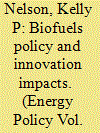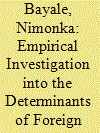|
|
|
Sort Order |
|
|
|
Items / Page
|
|
|
|
|
|
|
| Srl | Item |
| 1 |
ID:
183589


|
|
|
|
|
| Summary/Abstract |
In the early 2000s, governments implemented policies stimulating the use of ethanol and biodiesel to reduce carbon emissions and encourage domestic energy production. Blend mandates requiring gasoline or diesel to contain a minimum percentage of these biofuels were a favored policy instrument. Theoretical work by Clancy and Moschini (2017) concluded that, if innovation were stimulated by mandates, then the socially optimal mandate would be higher than if innovation were not possible. We test the impact of blend mandates and other biofuels policies on innovation using measures of patenting activity that correspond with research effort and research output. Our analysis shows that ethanol blend mandates significantly increased both R&D effort and quality-weighted innovation output in biofuels technologies while reducing the R&D inputs to plant technologies. This suggests that biofuels innovation increased in response to the policies, with firms substituting some R&D effort away from plant technologies research. Despite decreased R&D effort, output of plant innovation held steady as effort shifted to biofuels, supporting the presence of a spillover effect between biofuels innovation and plant innovation. We find that biodiesel blend mandates did not significantly impact R&D efforts in either plant or biofuels technologies. Furthermore, policies other than blend mandates had varying effects, ranging from limited increases in R&D activity to significant decreases in innovation.
|
|
|
|
|
|
|
|
|
|
|
|
|
|
|
|
| 2 |
ID:
184060


|
|
|
|
|
| Summary/Abstract |
This paper introduces model uncertainty into the empirical study on the determinants of foreign aid at the regional level. This is done by adopting a panel Bayesian model averaging approach applied on the data of 10 Sahel countries spanning from 1985 to 2017. Our results suggest that, among the regressors considered, those reflecting trade stakes including arm imports, institutional conditions and socioeconomic prospects tend to receive high posterior inclusion probabilities. These findings are robust to changes in the model specification and sample composition and are not meaningfully affected by the linear panel data model applied. The results highlight three concerns that justify aid flows towards Sahel countries: (i) interest of donors (self-interest), (ii) recipient economic needs and (iii) security purposes. The paper recommends Sahel countries to strengthen international cooperation for security and peace in compliance with the 13th goal of the Agenda 2063 of the African Union.
|
|
|
|
|
|
|
|
|
|
|
|
|
|
|
|
| 3 |
ID:
171045


|
|
|
|
|
| Summary/Abstract |
This paper introduces model uncertainty into the empirical study of the determinants of terrorism at country level. This is done by adopting a Bayesian model averaging approach and accounting for the over-dispersed count data nature of terrorist attacks. Both a broad measure of terrorism and incidents per capita have been analyzed. Our results suggest that, among the set of regressors considered, those reflecting labor market conditions and economic prospects tend to receive high posterior inclusion probabilities. These findings are robust to changes in the model specification and sample composition and are not meaningfully affected by the generalized linear regression model applied. Evidence of a geographically heterogeneous relationship between terrorism and its determinants is also provided.
|
|
|
|
|
|
|
|
|
|
|
|
|
|
|
|
| 4 |
ID:
167031


|
|
|
|
|
| Summary/Abstract |
Access to electricity continues to be a popular subject in empirical studies. However, the choice of key factors related to electricity access in the literature to date has been ad hoc due to the lack of a theoretical framework. This paper adopts a Bayesian Model Averaging (BMA) approach to selects important factors related to electricity access from 26 socioeconomic indicators using a sample of 48 developing countries, and reveal their long-term relationship with electricity access. The BMA approach allows us to identify the optimal empirical model when a theoretical foundation is not available. Moreover, it allows us to address the relative importance of variables using posterior inclusion probabilities and thus has clear policy relevance. Our results show that access to finance, education, economic development, infrastructure, and industrialisation are positively related to electricity access in the long-run. Although the long-run relationship does not indicate causality, it shows that to maintain this relationship, policy adjustments against any deviations from the relationship are needed. Our study suggests that electrification needs not only economic, educational and infrastructural development, but also private sector participation, governments’ commitment and political will, and integration with poverty reduction and other development schemes.
|
|
|
|
|
|
|
|
|
|
|
|
|
|
|
|
| 5 |
ID:
189453


|
|
|
|
|
| Summary/Abstract |
This paper studies the determinants of terrorism at the sub-national level in Colombia during 2001–2014. In order to establish robust relationships, a Bayesian model averaging framework has been implemented using departmental data. We find that the violence suffered by this country is linked to economic factors, especially labor market outcomes. The results obtained are not significantly altered by the use of relative measures of terror, the specification of alternative parameters and model priors or the presence of spatial dependence. The main conclusion drawn from our analysis is that an appropriate strategy to fight against terrorism in similar contexts is to increase its opportunity cost. This might be achieved through the promotion of inclusive socioeconomic development, primarily in rural areas.
|
|
|
|
|
|
|
|
|
|
|
|
|
|
|
|
|
|
|
|
|